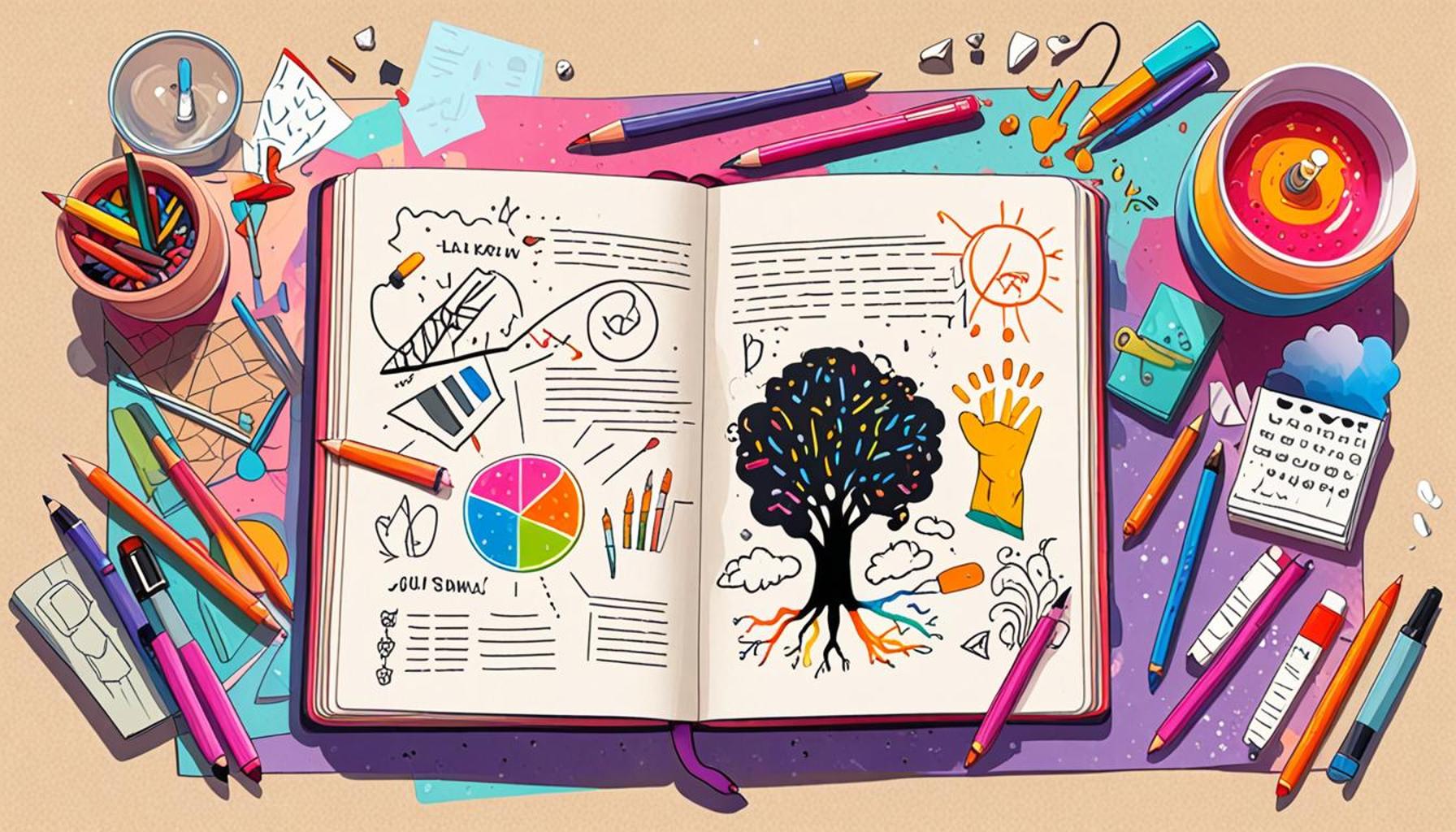The Role of Reflective Journaling in Overcoming Challenges and Failures

The Benefits of Reflective Journaling
In moments of challenge and failure, individuals often pursue various methods for recovery and growth, seeking pathways not only for healing but for deeper understanding of themselves. One particularly impactful practice that has surged in popularity is reflective journaling. This form of personal expression not only encourages introspection but also fosters resilience and emotional intelligence.
Reflective journaling serves as a powerful tool, acting as a mirror for individuals to:
- Analyze their thoughts and emotions. By recording emotions on paper, individuals can articulate feelings they may not fully grasp, allowing for clearer insights into their mental state.
- Identify patterns in their behaviors. Over time, patterns emerge that reveal how specific thoughts and emotional responses influence actions, helping individuals make informed decisions to alter negative cycles.
- Document lessons learned from setbacks. Journaling provides a means to track growth, transformation, and understanding, transforming failures into lessons that contribute to future successes.
For many Nigerians, where societal pressures, familial expectations, and economic challenges can escalate stress levels, reflective journaling offers a vital, private refuge. It serves as a contemplative space to navigate various life hurdles. Through this practice, individuals can:
- Articulate feelings about failures. Writing down experiences related to aspirations or shortcomings can help individuals process these feelings constructively, rather than allowing them to simmer internally.
- Set actionable goals for improvement. Reflective journaling encourages people to create concrete plans for personal development, breaking down larger objectives into manageable tasks, fostering a sense of purpose.
- Celebrate small victories amidst adversity. In a culture that often emphasizes survival over success, reflecting on and noting daily achievements—no matter how minor—can build a positive mindset and enhance motivation.
Moreover, this practice significantly enhances self-awareness. By routinely reflecting on experiences, individuals can approach challenges with greater clarity and understanding, empowering them to tackle issues with a sense of perspective and calm. Thus, reflective journaling not only nurtures personal growth, but it also establishes a strong foundation for emotional well-being.
In essence, the art of reflective journaling encourages a deeper dialogue within oneself, promoting healing, growth, and a sense of peace amidst life’s complexities. It invites individuals in Nigeria and beyond to embark on a transformative journey of self-discovery, reinforcing the idea that every challenge presents an opportunity for growth.

ADDITIONAL INSIGHTS: Expand your understanding here
Navigating Challenges Through Self-Reflection
The process of overcoming challenges and failures can often feel overwhelming, especially in a vibrant and complex nation like Nigeria, where cultural expectations and socio-economic realities can add layers of pressure. Reflective journaling emerges as a proactive strategy that individuals can adopt to facilitate personal growth and resilience during such trying times. By engaging in this practice, people can create a structured approach to understanding their circumstances, cultivating a mindset geared towards success.
One of the primary benefits of reflective journaling is its ability to enhance clarity of thought. When faced with adversity, individuals often experience a whirlwind of emotions, ranging from frustration to hopelessness. By putting pen to paper, they can sift through these feelings, thereby gaining a clearer perspective on the situation at hand. This process can involve:
- Breaking down complex emotions: Writing allows individuals to deconstruct their feelings into manageable parts, which can be particularly beneficial for those grappling with issues like unemployment or relationship stress, common to many Nigerians.
- Creating a safe space for vulnerability: A journal offers a private sanctuary where individuals can express their fears and insecurities without the judgement of peers, thereby freeing them to be honest about their failures.
- Encouraging positivity: Reflective journaling can lead to a natural shift from negative thoughts as individuals document their feelings and begin to search for silver linings or lessons learned from their experiences.
Furthermore, reflective journaling can serve as a form of emotional release. In a society where self-expression isn’t always encouraged, especially for men, capturing thoughts on paper can provide a meaningful outlet. This practice allows individuals from all walks of life to articulate their feelings about challenges they face, whether it be managing personal relationships or tackling educational setbacks. In doing so, they not only confront their issues but also create pathways towards resolution.
Another crucial aspect of reflective journaling is that it can help individuals set actionable goals for improvement. For instance, after reflecting on a failure, a person can identify specific areas where they wish to grow, such as enhancing their communication skills or managing time more effectively. By framing these goals, they can:
- Develop measurable objectives: Journals provide an opportunity to create SMART (Specific, Measurable, Achievable, Relevant, Time-bound) goals that break their aspirations into biting tasks.
- Track progress: Regularly noting accomplishments, no matter how small, allows individuals to visually see their journeys unfold, reinforcing their ability to overcome hardships.
- Maintain accountability: Setting written goals empowers individuals to hold themselves accountable, facilitating discipline and focus, key components of personal development.
In essence, reflective journaling is not merely a writing exercise; it is a powerful tool that encourages individuals to embrace their challenges and failures as integral parts of their growth journey. Through self-reflection, they can foster resilience and emotional intelligence, equipping them to thrive even amid adversity. In a fast-paced world, taking a moment to explore one’s inner landscape can lead to profound change and a renewed sense of purpose.
| Advantage | Explanation |
|---|---|
| Enhanced Self-Reflection | Reflective journaling encourages a deeper exploration of inner thoughts and feelings, allowing individuals to gain insights into personal triggers and reactions. |
| Contextualizing Failures | Writing about challenges within the context provides clarity, helping to transform experiences into valuable lessons rather than mere setbacks. |
In the realm of overcoming obstacles, reflective journaling serves as a powerful tool for personal growth. One key advantage is the Enhanced Self-Reflection it fosters. This practice encourages individuals to delve into their emotions, promoting a deeper understanding of their responses to failures and the circumstances that led to them. By regularly documenting feelings and thoughts, a person can track patterns, thus facilitating emotional intelligence.Moreover, the act of Contextualizing Failures through journaling adds significant value. It allows individuals to view setbacks not as endpoints but as stepping stones toward improvement. By framing experiences within a broader narrative, they can extract wisdom and process feelings that otherwise might lead to frustration or self-doubt. Embracing the art of reflective journaling can ultimately pave the way for resilience and a constructive approach to the complexities of life.
YOU MAY ALSO LIKE: Read read another article
Building Resilience Through Reflective Journaling
While reflective journaling provides a platform for addressing immediate emotional responses to challenges and failures, it also plays a significant role in fostering long-term resilience. In a nation where the spirit of “never give up” is often celebrated, the art of journaling can serve as a beacon of hope for individuals who might otherwise feel defeated. It offers a structured means to develop not only personal insight but also emotional fortitude necessary for navigating life’s hardships.
One of the most compelling aspects of reflective journaling is its capacity to promote a growth mindset. This concept, championed by education expert Carol Dweck, suggests that people who view challenges as opportunities for growth are more likely to overcome adversity. Through the practice of reflective writing, individuals can encourage themselves to embrace failures as stepping stones rather than setbacks. To do this effectively, individuals can:
- Document past successes: Reflective journaling allows individuals to revisit their previous achievements. This recollection can reignite motivation and highlight that failures do not define one’s abilities or future potential.
- Develop coping strategies: By reflecting on challenges faced in the past, individuals can identify effective strategies that worked for them previously. This catalog of experiences can serve as a valuable resource when similar issues arise in the future.
- Stay flexible and curious: Journals encourage a mindset where individuals can explore multiple perspectives on their challenges, fostering creativity in problem-solving and adaptability to change.
The effectiveness of reflective journaling is further amplified when supplemented with community dialogue. In Nigeria, where collective efforts often enhance individual ambition, sharing journal entries with trusted friends or mentors can provide a broader perspective. This communal approach encourages individuals to seek feedback and support, which can help in overcoming feelings of isolation that often accompany challenges. For instance:
- Group journaling sessions: Engaging in shared reflective practices, such as in workshops or support groups, can cultivate a sense of belonging, making individuals more resilient as they realize they are not alone in their struggles.
- Collaborative goal-setting: When individuals share their journaling goals with peers, they create a network of accountability, thus motivating one another to strive toward success.
- Leverage local narratives: By exchanging experiences with others from similar backgrounds, individuals can gain insights into culturally relevant solutions and support systems, which might not have been evident in solitude.
In addition to personal growth, reflective journaling fosters emotional intelligence, an essential skill for navigating both personal and professional relationships. By regularly analyzing reactions to challenges, individuals can increase their understanding of emotional triggers and responses. This awareness not only enhances self-regulation but also promotes empathy toward others facing similar hurdles. A deeper emotional awareness results in stronger interpersonal relationships, crucial for communal living and collaboration in Nigeria’s diverse settings.
Moreover, journaling can be a powerful tool for young Nigerians. For the youth grappling with academic pressures, social expectations, and career uncertainties, maintaining a reflective journal can delineate their aspirations and fears. By articulating their thoughts, young individuals can gain confidence in their decision-making capabilities, thus positioning themselves as proactive agents of change in their communities.
In this digital age, the practice of reflective journaling has even evolved to accommodate modern lifestyles. Various mobile applications and online platforms offer easy access to journaling tools, enabling users to reflect anytime and anywhere. These digital spaces can foster community discussions, further broadening the impact of reflective journaling as a means to overcome challenges and failures.
SEE ALSO: Click here to read another article
Conclusion: Embracing Growth Through Reflective Journaling
In a world where challenges and failures are inevitable, reflective journaling emerges as a crucial tool for personal development and emotional resilience. By documenting thoughts, emotions, and experiences, individuals not only foster self-awareness but also gain clarity on their journey through adversity. This practice allows people to identify patterns in their responses to struggles, encouraging a constructive approach to setbacks.
Moreover, the integration of community dialogue enriches the reflective process, providing invaluable support that can enhance personal growth. As Nigerians increasingly embrace the power of collective narratives, sharing journaled experiences can foster a sense of camaraderie and shared resilience. From group journaling sessions to collaborative goal-setting, these communal practices further cultivate an environment where individuals feel empowered to learn from one another’s challenges.
The digital age offers innovative platforms for reflective journaling, making it accessible to a wider audience, especially the youth. By leveraging technology, young Nigerians can carve out personal narratives that not only address their current challenges but also inspire collective action for a brighter future. As reflective journaling gains traction, it serves as more than just a coping mechanism; it blossoms into a beacon of hope, personal agency, and continuous growth.
In conclusion, the role of reflective journaling in overcoming challenges and failures is profound. Whether individually or collectively, this practice enables personal insight, emotional intelligence, and community connection. It invites everyone to embrace their unique journeys, transforming obstacles into opportunities for growth. By harnessing the power of journaling, individuals can emerge stronger from their adversities, ultimately fostering a culture of resilience and positivity in Nigeria.


